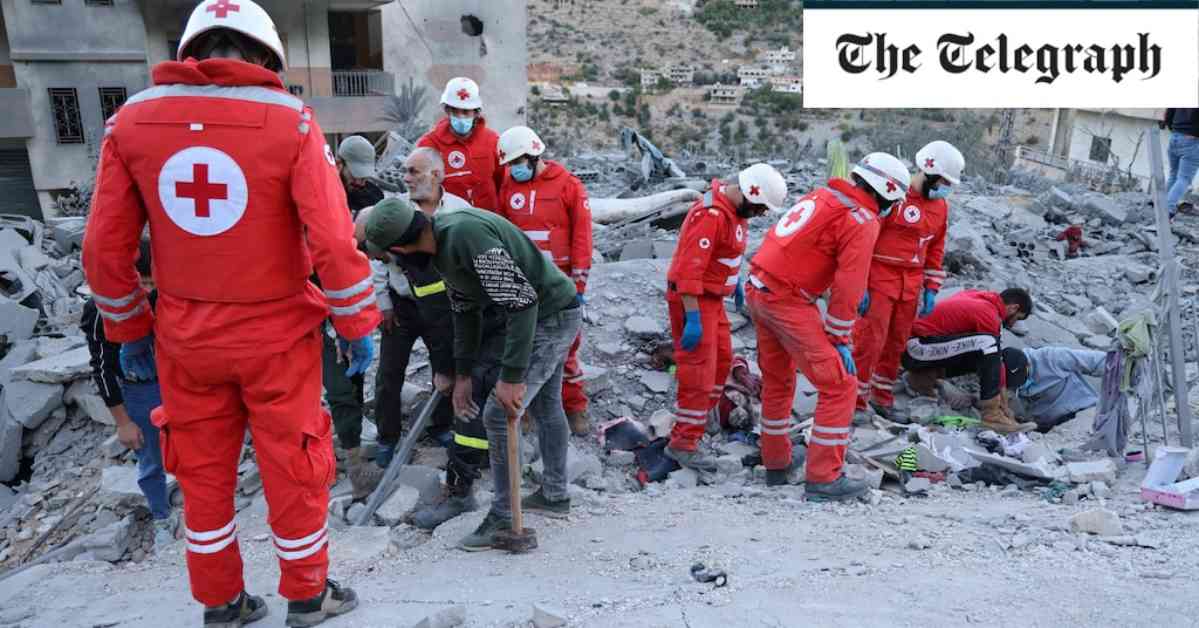Israeli Strike Kills Five Syrian Soldiers on Lebanon Border
In a tragic turn of events on the Lebanon border, an Israeli strike has resulted in the deaths of five Syrian soldiers. The incident occurred at 11:15 AM, highlighting the ongoing tensions in the region.
Mass Exodus from Lebanon to Syria
The violence in the area has prompted a significant exodus of over 30,000 individuals from Lebanon into Syria in the past 72 hours. The majority of those fleeing are Syrians, with around 80% of the crossings attributed to them, while the remaining 20% are Lebanese. Gonzalo Vargas Llosa, the UNHCR representative in Syria, revealed that approximately half of the refugees are children and adolescents, with women outnumbering men in the crossings. The challenging journey from a country engulfed in war to one grappling with a long-standing conflict has further exacerbated the humanitarian crisis in the region.
Lebanon’s Diverse Landscape Amidst Conflict
The contrasting landscapes of Lebanon paint a vivid picture of the country’s dual reality. While the hill resorts of Mount Lebanon offer a semblance of normalcy, the situation drastically changes as one descends into the Bekaa Valley. This region, a Hezbollah stronghold, has been the target of Israeli airstrikes, causing tension and fear among the local population. In the village of Hezarta, the impact of these strikes is palpable, with deserted establishments and harrowing stories of loss emerging. The resilience of individuals like Amal, an elderly restaurant owner, underscores the deep-rooted attachment to their land despite the looming threat of violence.
Trump’s Call for Diplomacy with Iran
Against the backdrop of escalating tensions in the Middle East, Donald Trump’s unexpected proposal to engage in diplomatic negotiations with Iran has sparked intrigue. The former US president’s willingness to consider a deal with Iran as a means to quell the conflict signals a potential shift in diplomatic strategies. Trump’s decision to withdraw from the nuclear deal negotiated during the Obama administration adds a layer of complexity to the ongoing geopolitical dynamics in the region.
IDF’s Ongoing Operations in Lebanon
The Israel Defense Forces (IDF) have intensified their operations in Lebanon, targeting Hezbollah strongholds and infrastructure. Reports of the destruction of a Hezbollah rocket launcher underscore the military’s efforts to neutralize threats posed by the militant group. Footage released by the IDF showcases the precision of the strikes carried out across southern Lebanon, signaling a determined stance in addressing security concerns along the border.
Calls for Ceasefire and Diplomatic Resolution
Amidst the escalating violence, Keir Starmer’s impassioned plea for a ceasefire between Israel and Hezbollah resonates with the international community. The need for both parties to de-escalate tensions and prioritize diplomatic negotiations to avert a wider regional conflict is paramount. Starmer’s address at the UN General Assembly underscores the urgency of halting hostilities and creating space for dialogue and reconciliation. The devastating impact of the conflict on civilian populations, exemplified by the tragic loss of a family in a recent Israeli airstrike, highlights the human toll of the ongoing violence.
Netanyahu’s Focus on Iran and Regional Stability
Israeli Prime Minister Benjamin Netanyahu’s unwavering focus on Iran as a destabilizing force in the region takes center stage in the current crisis. His longstanding concerns about Iran’s support for proxy groups across the Middle East, including Hezbollah, underscore the gravity of the situation. Amidst heightened tensions and military engagements, Netanyahu’s warnings about the nuclear ambitions of Iran resonate with Western leaders grappling with the complex geopolitical landscape in the region. As he prepares to address the UN, Netanyahu’s message is clear: the threat posed by Iran must be addressed decisively to safeguard regional stability.
Hezbollah’s Provocative Actions and Israeli Response
The recent escalation of violence, including Hezbollah’s rocket attacks on Israeli cities like Tiberias, underscores the volatile nature of the conflict. The militant group’s retaliatory actions in response to Israeli airstrikes reflect a dangerous cycle of violence that threatens to spiral out of control. The Israeli military’s interception of rockets and drones from Lebanon highlights the ongoing security challenges faced by both countries. The targeted strikes and counterattacks exemplify the strategic calculations and risks at play in the conflict.
In Conclusion
As the conflict between Israel and Hezbollah escalates, the need for a ceasefire and diplomatic resolution becomes increasingly urgent. The humanitarian toll, military operations, and regional implications of the crisis underscore the complex web of challenges facing the Middle East. Amidst the upheaval and uncertainty, international efforts to de-escalate tensions, promote dialogue, and prioritize peace remain crucial in charting a path towards stability and security in the region.












